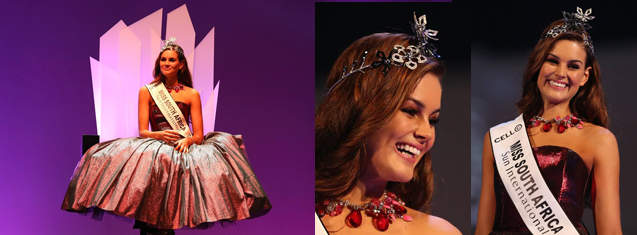
Rolene Strauss
Images: www.facebook.com/#!/MsSouthAfrica
“Rolene Strauss is an example of physical beauty, academic excellence and public duty coming together in one person,” said Prof Jansen.
Twenty-one-year-old Rolene Strauss, a third-year medical student at the University of the Free State (UFS), was crowned as Miss South Africa at a gala event at Sun City the weekend. Rolene was also the favourite on Twitter.
In her acceptance speech, Rolene said that she dearly loves South Africa. “This is where I can live, speak, learn and love freely. This is where my dreams come true. I am very proud of our country and shall always have a purpose here. It is such a privilege to represent our wonderful country. Our future is bright and I can’t wait to represent South Africa nationally and internationally,” Rolene said.
“My passion for health will definitely form a big part of my year, together with the initiatives of the sponsors,” she said.
Rolene said that Prof Jonathan Jansen, the Vice-Chancellor and Rector of the UFS, is an inspiration to her. “He stands up for what he believes in and enjoys what he is doing. He wants the best for his students and supports them in everything they do,” she said.
“Thanks to the support of the UFS and Prof Jansen, I am able to stop my studies for a year and continue after my Miss South Africa year. I am who I am today because of the people around me – and that definitely includes Kovsies. I see the university as a garden in which I can flower,” she said.
The university community is very proud of Rolene, and it is confirmed by Prof Jansen. “I am extremely proud of Rolene Strauss, for she has proved that physical beauty, academic excellence and public duty can come together in one person, and offer a powerful platform for transforming communities in need that would otherwise remain invisible, were it not for such a wonderful young role model,” he said.
On the year which lies ahead, Rolene said: “It will be a year during which I shall give back, say thank you and be a good example of the potential that especially women and South Africans may have in our country.”